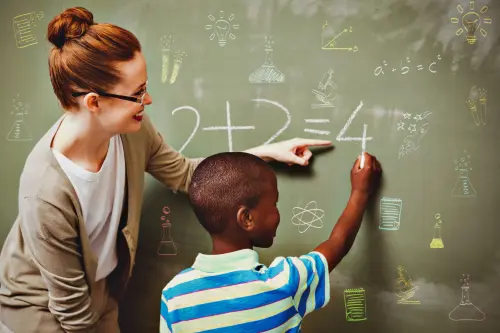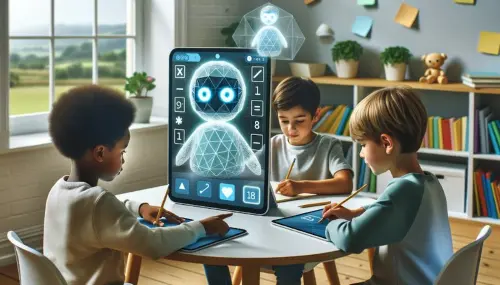For many students, math conjures images of dusty textbooks filled with complex formulas and endless rows of practice problems. But what if math could be more than just rote memorization and number crunching? What if it could be an exciting journey of discovery, a playground for creativity, and a key to unlocking the beauty of patterns and logic?
The good news is, it can! By venturing beyond traditional textbooks, you can embrace a world of creative approaches that make learning math not just effective but also enjoyable. With a growth mindset, a touch of creativity, and the right tools, like those offered on the official login link to Gauth, you can unlock the world of math and its endless possibilities!

Unlocking the Power of Play
Our brains naturally gravitate towards activities that are fun and engaging. Here’s where the power of play comes in. By incorporating games and activities into your learning, you can transform math concepts into exciting challenges:
- Board Games and Puzzles: Many classic board games like Monopoly, Scrabble, and even chess involve strategic thinking and logical reasoning, skills essential in math. Explore board games specifically designed to reinforce mathematical concepts in a fun and interactive way.
- Card Games: Card games like blackjack and poker require calculating probabilities and making strategic decisions, both of which are valuable mathematical skills.
- Math Puzzles: Logic puzzles like Sudoku and KenKen engage your problem-solving capabilities and spatial reasoning skills in a playful manner. These puzzles come in various difficulty levels, allowing you to challenge yourself as your skills improve.
Making Math Tangible: Hands-on Learning
Learning by doing is a powerful approach that can solidify your understanding of math concepts. Here are some ways to make math tangible and interactive:
- Building with Blocks: Activities involving building with blocks, Legos, or other manipulatives are fantastic for younger learners. They can represent numbers visually, explore geometric shapes, and understand spatial relationships in a hands-on way.
- Cooking and Baking: In the kitchen, math comes alive! Follow recipes, measure ingredients, and calculate proportions – all valuable skills that reinforce understanding of fractions, decimals, and conversions.
- Art and Craft Projects: Math is deeply intertwined with visual arts and design. Explore projects like tessellations, geometric patterns, or origami. These activities allow you to see the practical applications of math concepts in creating beautiful art.
Connecting Math to the Real World: Relevance is Key
One of the biggest challenges in learning math is the perceived lack of relevance. Here’s how you can bridge the gap and demonstrate the practical applications of math in everyday life:
- Science Experiments: Science experiments are a great way to integrate math and scientific concepts. Measure variables, design experiments, and analyze data – all essential mathematical skills used in scientific inquiry.
- Personal Finance: Learning about budgeting, calculating interest rates, and understanding financial planning principles all involve utilizing mathematical concepts in managing your personal finances.
- Sports Statistics: Analyze batting averages, calculate win probabilities, or track player performance data. Statistics rely heavily on mathematical tools and analysis, making sports a fascinating arena to explore real-world applications of math.
Embracing Technology: A World of Learning Tools

Technology offers a vast array of tools and resources to enhance your math learning experience. Here are some ways to leverage technology:
- Educational Apps: Explore educational apps specifically designed to make learning math engaging and interactive. These apps often incorporate gamification elements, provide personalized learning paths, and offer immediate feedback on your answers.
- Interactive Websites: Many websites offer free video tutorials, practice problems, and interactive simulations that cater to different learning styles and provide in-depth explanations of mathematical concepts.
- Online Math Tutors: Platforms like Gauth utilize artificial intelligence (AI) to provide step-by-step solutions and explanations to math problems. Use this tool strategically! Don’t rely solely on getting the answer; focus on understanding the logic and thought process behind each step.
Harnessing the Power of Storytelling and History
Math isn’t just about numbers and equations; it has a rich history filled with fascinating stories about mathematicians and their discoveries. Here’s how to tap into the power of storytelling:
- Biographies of Mathematicians: Read about the lives and contributions of famous mathematicians like Pythagoras, Euclid, or Marie Curie. Their struggles, discoveries, and perseverance can be a source of inspiration for your own learning journey.
- Historical Context of Math: Understanding the historical context of mathematical concepts can make them more relatable. Explore how math evolved throughout history to address practical problems and advancements in science and technology.
- Math in Literature and Movies: Look for books and movies that incorporate math in interesting ways. For example, the movie “A Beautiful Mind” portrays the life of mathematician John Nash, and the book “The Curious Incident of the Dog in the Night-Time” features a protagonist who excels in math. These narratives can showcase the beauty and applications of math in unexpected ways.
Building a Supportive Community: Learning Together
Learning math doesn’t have to be a solitary endeavor. Collaboration and support can significantly enhance your learning experience. Here are some ways to connect with others:
- Form a Study Group: Working with peers allows you to explain concepts to each other, tackle problems collaboratively, and motivate each other during challenging moments.
- Online Math Forums and Communities: Explore online forums and communities dedicated to math learning. Connect with other students, share challenges, ask questions, and learn from diverse perspectives.
- Find a Mentor or Tutor: Having a supportive teacher or tutor who believes in your potential and encourages a growth mindset can make a significant difference. They can provide personalized guidance, address specific challenges you face, and celebrate your progress.
Creating a Positive Learning Environment
The environment you create for learning can significantly impact your experience. Here are some tips for fostering a positive and productive learning space:
- Choose a Quiet and Organized Space: Minimize distractions by finding a quiet corner in your home, library, or a study room on campus. Organize your materials like textbooks, notebooks, and calculators to facilitate focused learning.
- Develop a Positive Mindset: Approach math with a growth mindset, believing that your abilities can improve with effort and perseverance. Celebrate your progress, no matter how small, and focus on the joy of learning and discovery.
- Reward Yourself: Break down large goals into smaller, achievable milestones. Reward yourself for completing tasks to stay motivated and acknowledge your hard work.
Conclusion: A Lifelong Journey of Discovery
Math is a vast and fascinating subject with applications in every corner of our world. By venturing beyond traditional textbooks and embracing creative approaches, you can transform math from a dreaded chore into a fulfilling and enjoyable learning experience.
Remember, the journey of learning math is a lifelong adventure, filled with challenges and opportunities for growth. Utilize the resources available online and in your community, don’t be afraid to seek help when needed, and most importantly, embrace the joy of discovery and the satisfaction of mastering new mathematical concepts.
ABM College is a firm believer in the power of education. If you aspire to guide the next generation in their own journey, check out our online Education Assistant Diploma program or contact us for more details. You can also read more informative blogs right here.
About The Author

Private Career College
ABM College is a leader in career-focused education, committed to empowering students with industry-relevant skills. With expert instructors and practical training, ABM College delivers high-quality programs in health, business, technology, and more, ensuring graduates are prepared to meet workforce demands. Known for its supportive learning environment and a focus on real-world application, ABM College is a trusted educational partner helping students achieve professional success across Canada.
